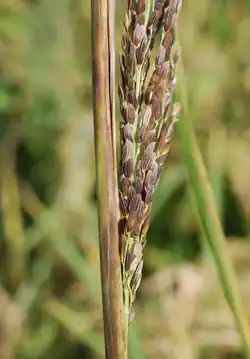Sarocladium
| Sarocladium | |
|---|---|

| |
| Sheath rot of rice | |
| Scientific classification | |
| Kingdom: | Fungi |
| Division: | Ascomycota |
| Class: | Sordariomycetes |
| Order: | Hypocreales |
| Family: | Sarocladiaceae |
| Genus: | W.Gams & D. Hawksw. (1976) |
| Type species | |
| Sarocladium oryzae (Sawada) W.Gams & D. Hawksw. (1976)
| |
Sarocladium is a genus of saprotrophic fungi found in crops, soil, plant debris, and rotting mushrooms. It was created by Walter Gams and David Leslie Hawksworth for the species of rice fungus, Sarocladium oryzae, in 1976.[1] The species are most notable as a causative pathogens of sheath rot of rice and blight in bamboo.[2] Species like S. strictum can cause infection in humans called hyalohyphomycosis (skin, nail and tissue infection) that can lead to fatal disease if improperly treated.[3][4]
Taxonomy
The first species of Sarocladium identified was S. oryzae. It was discovered by Japanese biologist Kaneyoshi (Kenkichi) Sawada from the rice field in Taiwan and described it in 1922 as Acrocylindrium oryzae.[5] But other fungi of the genus was already discovered in the early 19th century that was not identified as such. In 1839, Czech physician August Carl Joseph Corda identified the causative pathogen of skin and tissue infections as a fungi that he named Cephalosporium acremonium.[6] Although the fungi were morphologically similar, the relationship between the plant and human pathogenic species could not be understood until the development of DNA sequencing.[7]
In 1971, Walter Gams discovered saprophytic fungus from maize kernel and gave the name Acremonium strictum.[8][9] Gams's specimen was fund to be identical with Corda's C. acremonium, and both names became commonly used.[10][11] All related species were simply assigned under the genus Acremonium. The problem arose when the number of species increased to over 150, thereby making classification chaotic.[12][13] In 2011, Canadian mycologist Richard Summerbell and his European collaborators reanalysed the fungal group, and using DNA sequencing, concluded that C. acremonium/A. strictum and related fungi formed a genetically distinct group, and therefore reassigned in a separate genus, Sarocladium.[14] The genus Sarocladium was already established by Gams and David Leslie Hawksworth for the revision of Sawada's A. oryzae as Sarocladium oryzae in 1976.[15]
Species
- Sarocladium bacillisporum
- Sarocladium bactrocephalum
- Sarocladium bifurcatum
- Sarocladium brachiariae
- Sarocladium clematidis
- Sarocladium dejongiae
- Sarocladium gamsii
- Sarocladium glaucum
- Sarocladium hominis
- Sarocladium implicatum
- Sarocladium junci
- Sarocladium kiliense
- Sarocladium liquanense
- Sarocladium mycophilum
- Sarocladium ochraceum
- Sarocladium pseudostrictum
- Sarocladium sinense
- Sarocladium spinificis
- Sarocladium subulatum
- Sarocladium summerbellii
- Sarocladium oryzae
- Sarocladium strictum
- Sarocladium terricola
- Sarocladium zeae
References
- ^ Pearce, D. A.; Bridge, P. D.; Hawksworth, D. L. (2001), Sreenivasaprasad, S.; Johnson, R. (eds.), "Species Concept in Sarocladium, the Causal Agent of Sheath Rot in Rice and Bamboo Blight", Major Fungal Diseases of Rice: Recent Advances, Dordrecht: Springer Netherlands, pp. 285–292, doi:10.1007/978-94-017-2157-8_20, ISBN 978-94-017-2157-8, retrieved 2025-07-17
- ^ Pearce, D. A.; Bridge, P. D.; Hawksworth, D. L. (2001), Sreenivasaprasad, S.; Johnson, R. (eds.), "Species Concept in Sarocladium, the Causal Agent of Sheath Rot in Rice and Bamboo Blight", Major Fungal Diseases of Rice: Recent Advances, Dordrecht: Springer Netherlands, pp. 285–292, doi:10.1007/978-94-017-2157-8_20, ISBN 978-94-017-2157-8, retrieved 2025-07-17
- ^ Schell, W A; Perfect, J R (1996). "Fatal, disseminated Acremonium strictum infection in a neutropenic host". Journal of Clinical Microbiology. 34 (5): 1333–1336. doi:10.1128/jcm.34.5.1333-1336.1996. PMC 229014.
- ^ Sharma, Ajanta; Hazarika, N. K.; Barua, Purnima; Shivaprakash, M. R.; Chakrabarti, Arunaloke (2013-12-01). "Acremonium strictum: Report of a Rare Emerging Agent of Cutaneous Hyalohyphomycosis with Review of Literatures". Mycopathologia. 176 (5): 435–441. doi:10.1007/s11046-013-9709-1. ISSN 1573-0832. PMID 24121988. S2CID 8507289.
- ^ Pearce, D. A.; Bridge, P. D.; Hawksworth, D. L. (2001), Sreenivasaprasad, S.; Johnson, R. (eds.), "Species Concept in Sarocladium, the Causal Agent of Sheath Rot in Rice and Bamboo Blight", Major Fungal Diseases of Rice: Recent Advances, Dordrecht: Springer Netherlands, pp. 285–292, doi:10.1007/978-94-017-2157-8_20, ISBN 978-94-017-2157-8, retrieved 2025-07-17
- ^ Fincher, Ruth-Marie E.; Fisher, John F.; Lovell, Roger D.; Newman, Cheryl L.; Espinel-Ingroff, Ana; Shadomy, H. Jean (1991). "Infection Due to the Fungus Acremonium (Cephalosporium)". Medicine. 70 (6): 398–409.
- ^ Summerbell, R.C.; Gueidan, C.; Schroers, H-J.; de Hoog, G.S.; Starink, M.; Rosete, Y. Arocha; Guarro, J.; Scott, J.A. (2011). "Acremonium phylogenetic overview and revision of Gliomastix, Sarocladium, and Trichothecium". Studies in Mycology. 68: 139–162. doi:10.3114/sim.2011.68.06. PMC 3065988.
- ^ Saponaro, Anna; Montorsi, F. (1979). "Acremonium strictum Gams e Acremonium sclerotigenum (F. et R. Moreau ex Valenta) Gams su cariossidi di Mais". Phytopathologia Mediterranea. 18: 221–224. ISSN 0031-9465 – via JSTOR.
- ^ Lebeda, Alěs; Marvanová, Ludmila; Buczkowski, Jan (1987). "Acremonium strictum, a new potential pathogen in carrot flower stems". Zeitschrift für Pflanzenkrankheiten und Pflanzenschutz / Journal of Plant Diseases and Protection. 94 (3): 314–321. ISSN 0340-8159 – via JSTOR.
- ^ Peberdy, J. F. (1987), Peberdy, John F. (ed.), "Genetics of Acremonium", Penicillium and Acremonium, Boston, MA: Springer US, pp. 93–111, doi:10.1007/978-1-4899-1986-1_4, ISBN 978-1-4899-1986-1, retrieved 2025-07-17
- ^ Guarro, J.; Gams, W.; Pujol, I.; Gené, J. (1997-11-01). "Acremonium Species: New Emerging Fungal Opportunists—In Vitro Antifungal Susceptibilities and Review". Clinical Infectious Diseases. 25 (5): 1222–1229. doi:10.1086/516098. ISSN 1058-4838.
- ^ Glenn, Anthony E.; Bacon, Charles W.; Price, Robert; Hanlin, Richard T. (1996-05-01). "Molecular phylogeny of Acremonium and its taxonomic implications". Mycologia. 88 (3): 369–383. doi:10.1080/00275514.1996.12026664. ISSN 0027-5514.
- ^ Gräfenhan, T.; Schroers, H.-J.; Nirenberg, H.I.; Seifert, K.A. (2011-03-01). "An overview of the taxonomy, phylogeny, and typification of nectriaceous fungi in Cosmospora, Acremonium, Fusarium, Stilbella, and Volutella". Studies in Mycology. 68 (1): 79–113. doi:10.3114/sim.2011.68.04.
- ^ Summerbell, R.C.; Gueidan, C.; Schroers, H-J.; de Hoog, G.S.; Starink, M.; Rosete, Y. Arocha; Guarro, J.; Scott, J.A. (2011). "Acremonium phylogenetic overview and revision of Gliomastix, Sarocladium, and Trichothecium". Studies in Mycology. 68: 139–162. doi:10.3114/sim.2011.68.06. PMC 3065988.
- ^ Pérez-Cantero, Alba; Guarro, Josep (2020). "Sarocladium and Acremonium infections: New faces of an old opportunistic fungus". Mycoses. 63 (11): 1203–1214. doi:10.1111/myc.13169. ISSN 1439-0507.